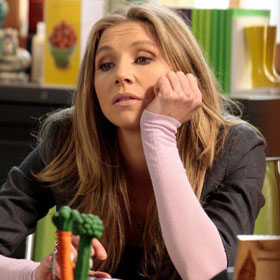'How To Live With Your Parents' Elicits Laughs, But Lacks Substance

2.5/5
The new ABC show How to Live with Your Parents (for the Rest of Your Life) is a mix of as many possible sitcom clichés that could be thrown together in one series. However, I won’t say the show outright lacks heart, because the actors certainly bring their "A" game to some otherwise incredibly dry material. As the pilot episode begins, we meet Polly (Sarah Chalke) and her daughter, Natalie (Rachel Eggleston), who have just arrived on Polly’s parents’ doorstep. We then fast forward to six months later, as Polly is still living in their home. Her mom, Elaine (Elizabeth Perkins) and her stepfather, Max (played by the hilarious Brad Garrett) are Type B personalities, very open about their sex lives, and absolutely nothing like Polly. They are painted as increasingly incompetent to the point that it's nearly impossible to believe they could have raised any child at all, let alone somebody as straight-laced as Polly. Polly’s flakey caricature of an ex-husband, Julian (Jon Dore), pops in throughout the episode for what I suppose is meant to be comic relief. The main storyline of the episode begins when Polly leaves Natalie alone with her parents overnight for the first time so she can go on a date, leading to typical wacky hijinks and misadventures in babysitting.
The devices in this show are nothing that television hasn’t seen before. There is no shortage these days of series about 20- and 30-somethings moving back in with their parents – mostly because so many young people seem to be doing so in real life. Polly says so herself when she tells the camera,“I’m not a failure, I’m trendy.” On top of that, we’ve all seen the quirky, ever-so-slightly “manic pixie dream girl”-esque single mom with a charming and somewhat socially unaware child. Naturally, we’re expected to somehow believe that she is approaching the point of “old and frumpy” despite her great hair, slim figure, and fair skin – the writers make this clear by giving her a pair of stylish thick-framed glasses (obviously glasses spell “old” and “dorky,” right?). The “free-spirited” parental characters who are a walking humiliation to their uptight child are nothing new in the world of television either. Also typical is Polly’s complete lack of emotion over having ended her marriage to a guy that seems entire devoid of any sort of depth.
Something very disheartening about this show is its shallow, elitist overtones. The characters are so nonchalant about it that it borders on tacky. I don’t believe that entertainment is obligated to be politically correct, but this show manages to turn itself into a giant “first world problem” and it is completely unnecessary. As a general rule, television is shallow. This does not come as a surprise to anybody, and viewers know better than to expect a sense of ingenuity or inclusiveness from a show. However, the way it is handled in How To Live With Your Parents is off-putting and does nothing to enhance the entertainment value or further the plot.
There is a moment near the end of the episode in which Polly is in the car with her mother, Elaine, wondering aloud if she’s a failure because she is a “divorced woman” (apparently we are living in the 1940s and being a woman without a spouse as opposed to a man without one is a source of shame). Her mom’s response to cheer her up is, “You’re a great mother” and “you’re very thin.” Really…? Being thin is the best attribute Polly has? When faced with all of the aspects of her daughter’s character and the way she lives her life, the most significant thing Elaine can come up with, besides being a good parent, is that she is thin? So that is all that women are good for – rearing children and being nice for men to look at – even in 2013? Hollywood has been perpetuating that notion for the last several decades, I suppose they may as well be upfront about it like they were in this scene.
Polly is continually rude and ungrateful to her parents even though they are letting them stay in their home out of their own kindness. This is a typical attitude of Americans toward their parents, but its unfortunate that this is not only portrayed in the show, but encouraged. The very last line of the episode is the biggest offender. Upon being annoyed by her parents yet again, Polly sighs and says in a voiceover, “I wonder if they have Wi-Fi in the homeless shelter.” Are you serious, ABC? There are countless things wrong with that elitist, upper-class statement. On top of that, it portrays Polly as a huge brat with zero understanding of actual struggle. That’s why the line is supposed to be funny – because the notion of her ever actually having to experience a homeless shelter is so improbable that it’s laughable. It's an incredibly disappointing and tactless line.
Despite all of that, there is a tiny little spark in this show that prevents it from being a total waste of time. I vaguely knew the show’s premise before watching it, and I expected to be doing nothing but rolling my eyes and scoffing throughout the entire episode. Instead, I found myself laughing hysterically, because the stars are so funny and dedicated. The actors’ talent and great comedic timing is out the league of this show’s writing, and the producers should consider themselves very lucky to have these stars to carry it for as long as they can. Comedy veteran Brad Garrett especially stands out with his trademark humor. Ultimately, How To Live With Your Parents can provide a little passing entertainment, but don’t expect it to do much else.
RELATED ARTICLES
Get the most-revealing celebrity conversations with the uInterview podcast!





Leave a comment